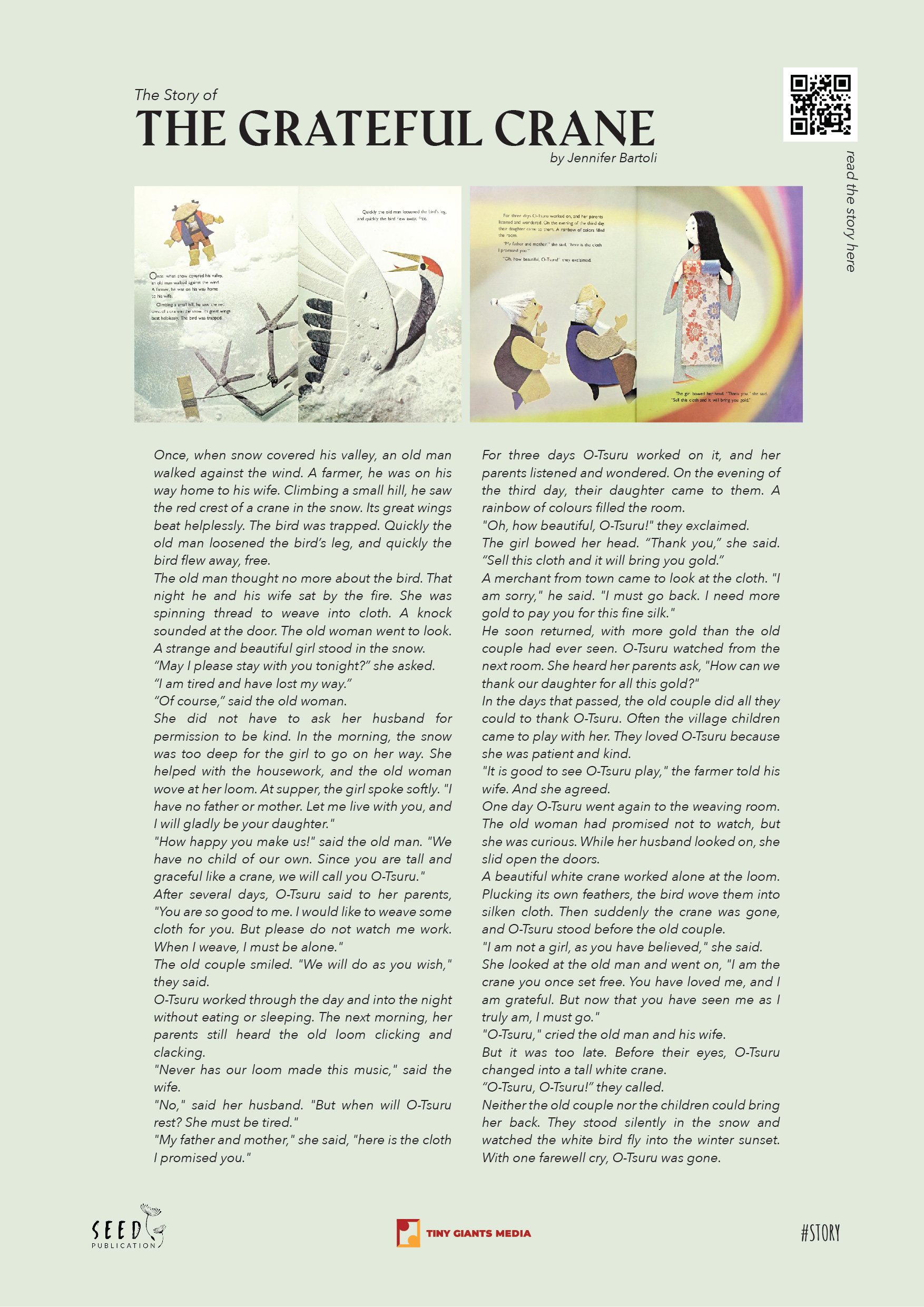The Grateful Crane, by Jennifer Bartoli.

Once, when snow covered his valley, an old man
walked against the wind. A farmer, he was on his
way home to his wife. Climbing a small hill, he saw
the red crest of a crane in the snow. Its great wings
beat helplessly. The bird was trapped. Quickly the
old man loosened the bird’s leg, and quickly the
bird flew away, free.
The old man thought no more about the bird. That
night he and his wife sat by the fire. She was
spinning thread to weave into cloth. A knock
sounded at the door. The old woman went to look.
A strange and beautiful girl stood in the snow.
“May I please stay with you tonight?” she asked.
“I am tired and have lost my way.”
“Of course,” said the old woman.
She did not have to ask her husband for
permission to be kind. In the morning, the snow
was too deep for the girl to go on her way. She
helped with the housework, and the old woman
wove at her loom. At supper, the girl spoke softly. "I
have no father or mother. Let me live with you, and
I will gladly be your daughter."
"How happy you make us!" said the old man. "We
have no child of our own. Since you are tall and
graceful like a crane, we will call you O-Tsuru."
After several days, O-Tsuru said to her parents,
"You are so good to me. I would like to weave some
cloth for you. But please do not watch me work.
When I weave, I must be alone."
The old couple smiled. "We will do as you wish,"
they said.
O-Tsuru worked through the day and into the night
without eating or sleeping. The next morning, her
parents still heard the old loom clicking and
clacking.
"Never has our loom made this music," said the
wife.
"No," said her husband. "But when will O-Tsuru
rest? She must be tired."
"My father and mother," she said, "here is the cloth
I promised you."
For three days O-Tsuru worked on it, and her
parents listened and wondered. On the evening of
the third day, their daughter came to them. A
rainbow of colours filled the room.
"Oh, how beautiful, O-Tsuru!" they exclaimed.
The girl bowed her head. “Thank you,” she said.
“Sell this cloth and it will bring you gold.”
A merchant from town came to look at the cloth. "I
am sorry," he said. "I must go back. I need more
gold to pay you for this fine silk."
He soon returned, with more gold than the old
couple had ever seen. O-Tsuru watched from the
next room. She heard her parents ask, "How can we
thank our daughter for all this gold?"
In the days that passed, the old couple did all they
could to thank O-Tsuru. Often the village children
came to play with her. They loved O-Tsuru because
she was patient and kind.
"It is good to see O-Tsuru play," the farmer told his
wife. And she agreed.
One day O-Tsuru went again to the weaving room.
The old woman had promised not to watch, but
she was curious. While her husband looked on, she
slid open the doors.
A beautiful white crane worked alone at the loom.
Plucking its own feathers, the bird wove them into
silken cloth. Then suddenly the crane was gone,
and O-Tsuru stood before the old couple.
"I am not a girl, as you have believed," she said.
She looked at the old man and went on, "I am the
crane you once set free. You have loved me, and I
am grateful. But now that you have seen me as I
truly am, I must go."
"O-Tsuru," cried the old man and his wife.
But it was too late. Before their eyes, O-Tsuru
changed into a tall white crane.
“O-Tsuru, O-Tsuru!” they called.
Neither the old couple nor the children could bring
her back. They stood silently in the snow and
watched the white bird fly into the winter sunset.
With one farewell cry, O-Tsuru was gone.
From Japanese folktales.
More like that:





























